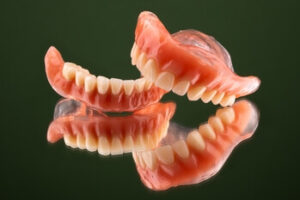Dentures have been around for centuries, with the first ones being made out of wood. Nowadays, there are different types of materials that can be used to make dentures, and there are also different ways to keep them in place.
It is essential to understand all of the options available before making a decision about which type of denture is right for you. Here is a brief overview of the different types of dentures and how they stay in place.
Partial Dentures
Partial dentures not only offer support to your remaining teeth, but they also help fill in any gaps left behind by lost ones.
The denture teeth firmly attach to your remaining teeth, ensuring it remains securely in place.
These false teeth use your teeth’s deep roots for a robust, secure fit. To ensure that the partial denture is strong and stable in place, you can get dental implants to act as anchors.
Complete Dentures
For full dentures to function properly, there must be a slight layer of saliva between the denture, gum line, and jaw bone.
The natural shape of your jaw helps to keep dentures in place, although a zinc-free denture adhesive can be used for added stability.
Since complete dentures don’t have the support of your natural teeth, you may need to get used to them before they feel like a part of your mouth. With some practice and patience, though, you can soon enjoy their comfortable fit!
Lower Suction Dentures
Lower suction dentures are an innovative dental technology crafted to fit your lower jaw. As their title implies, they utilise suction in order to remain firmly fixed in place.
For those who have experienced the loss of their lower teeth and are seeking a more reliable fit without having to undergo surgery, lower suction dentures provide an excellent solution.
Ultimately, not everyone is a candidate for lower suction dentures; these devices largely depend on the shape and structure of your individual jaw.
Don’t hesitate to consult our experienced professionals and determine if lower-suction dentures are suitable for you.
Upper Suction Dentures
The upper denture has a suction seal beaded in the back part of the denture. This, coupled with your mouth’s moisture, provides somewhat of a seal. This unique design of dentures helps to keep them in place during all activities, including speaking and eating.
Upper suction dentures can provide an even greater sense of security than traditional dentures. As with lower suction dentures, however, it is best to consult a dental professional before opting for this type of device.
Dentures Over Implants
For optimal protection and reliability in your smile, dentures are the ideal solution for those looking for dependable dental prostheses.
Ensure a secure fit for your dentures with surgically implanted anchor points, allowing them to comfortably stay in place and be resilient over time. With the ability to reduce slipping out of your dentures, you can enjoy peace of mind knowing that they are safely secured.
Dentures are often the go-to choice for those who have lost many teeth, as they can help you regain your gorgeous smile and let you enjoy all of your favourite foods again.
When it comes to replacing missing teeth, dentures provide a remarkably natural feeling while also encouraging jawbone stimulation. This not only slows down bone loss but keeps your facial structure intact over time as well.
These dentures are not only dependable and safe but also remarkably comfortable for the wearer. Furthermore, they necessitate fewer readjustments than other varieties of dentures available today, making them an ideal solution if you’re searching for a durable fix!
Denture Adhesives
For extra security, many denture-wearers choose to use a top-notch adhesive. With this addition to your oral care toolkit, you will experience increased ease and comfort – especially if you are new to wearing dentures.
If your new dentures require using adhesive, make sure to clean them thoroughly and regularly, as the stickiness could trap in food remnants and other debris, which can cause skin discomfort if not removed.
Why Do Some Dentures Stay in Position Better Than Others?
For certain patients, the anatomical structures of their mouths are not sufficient to retain dentures properly.
The predominant problem lies in the lack of a solid lower ridge that would otherwise enable the denture to stay firmly attached along the jawline.
Additionally, some individuals may experience a dry mouth that prohibits the formation of saliva needed to construct and sustain suction.
People who take multiple medications are more likely to experience dry mouth.
Denture Customisation


Dentures have been updated to offer you an exact match for your teeth and gums. This tailor-made design will guarantee a snug fit along the ridges of your bone and gum line for superior comfort.
The Role of Denture Fixatives
Despite the fact that denture fixatives are typically used for people with ill-fitted dentures, many individuals who wear them can benefit from the improved comfort and stability offered by these products.
Despite this, there are cases where dentures might need a little extra support. Even though they’re specifically designed to fit perfectly in the patient’s mouth, it doesn’t guarantee that all adjustments will be successful and comfortable for extended use. With some added reinforcement, you can give your dentures even more of an advantage!
Denture fixatives not only promote a sense of assurance and stability but also provide ultimate comfort.
Secure your dentures in place with a powerful and reliable fixative so that you never have to worry about embarrassing slips or loosening.
Denture fixatives not only provide a secure fit, but they can also help prevent those pesky food particles from slipping below the plate.
How to Know if Your Dentures Are Loose
Dentures that no longer fit snugly or slip require a fixative, adjustment, or replacement.
Furthermore, you may notice a clicking noise while conversing and experience some discomfort. Some people even have minor sores due to poorly fitted dentures.
Just remember to be cautious with hard or sticky foods like chewing gum.
Conclusion
With advancements in modern technology, custom-made dentures offer an exact match for your unique mouth shape and structure, ensuring superior comfort and security over time.
Ultimately, understanding all of the options behind – how do dentures stay in place? – will ensure that you have the best possible solution when replacing lost teeth!
If you are experiencing any difficulty while enjoying meals due to your dentures, schedule an appointment with our prosthetists as soon as possible. Don’t suffer in silence – let the professionals at Custom Denture Clinic help make eating a pleasurable experience again!
Buderim: (07) 5317 1023
Caloundra: (07) 5315 8076
Sources
Dentures
https://www.healthdirect.gov.au/dentures
Stability In Mandibular Denture
https://www.ncbi.nlm.nih.gov/books/NBK549861/
Denture Adhesives
https://dph.illinois.gov/topics-services/prevention-wellness/oral-health/fast-facts-oral-health/denture-adhesives.html
Suction in lower dentures
https://pubmed.ncbi.nlm.nih.gov/20242482/





Recent Comments